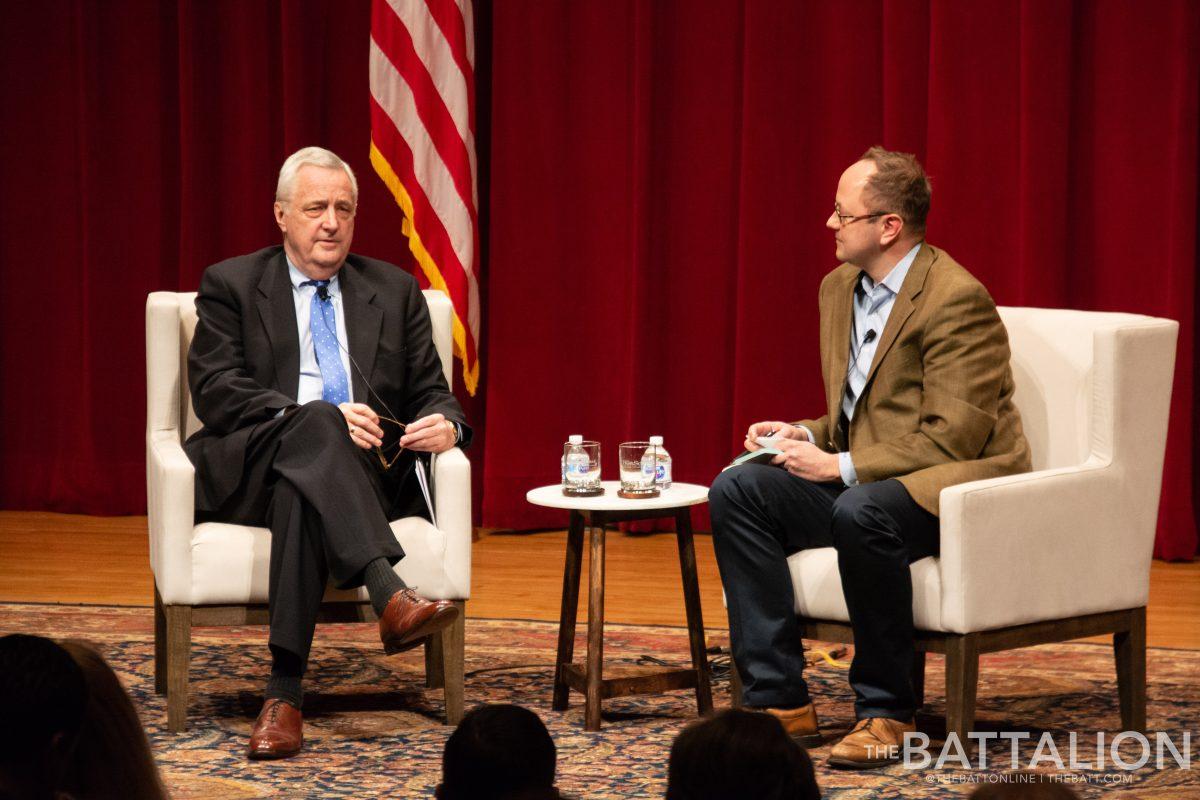On Feb. 28, the Bush School’s Scowcroft Institute of International affairs hosted Professor David Shambaugh for an event entitled “U.S. – China Relations at 40: Where Have We Been and Where Are We Going?” During this seminar, Shambaugh shared his views and expertise on US-Chinese international relations.
Shambaugh, a professor of political science at George Washington university, specializes in Asian studies and international relations and is an esteemed author of over 30 books on China and international relations within China.
It has been 40 years since the formal normalization of US-China the relationship. This event took place in 1979 when the US publicly announced the country’s recognition of the People’s Republic of China rather than the Republic of China, which is now based in Taiwan. Shambaugh told the audience that he attended the monumental event while he worked for the State Department’s China-Asia team under President Jimmy Carter.
“The anniversary seems almost like yesterday but indeed, four decades have passed,” Shambaugh said. “The relationship, in all seriousness has weathered a number of turbulent times, including under both Bush 41 and 43’s presidencies.”
Shambaugh said that Bush placed great value on US-China relations, even unconventionally visiting Beijing on his first international trip during his presidency; it was during his administration that US-China relations reached a turning point.
“On Bush 41’s launch, the relationship was, of course, rocked by the June 4, 1989 events in Tiananmen Square less than six months after President Bush entered the White House,” Shambaugh said. “This was a real turning point in the relationship and, in some real ways, the relationship has never recovered.”
Shambaugh explained that the 1980s were perhaps the best years of the United State’s relationship with China. Shambaugh said the US had a virtual strategic allegiance, with active military, economic and even cultural ties. It was not until the protests of Tiananmen Square that American influence on the lives of Chinese citizens became openly visible.
“[Protestors] erected a replica of the Statue of Liberty right in the center of Tiananmen Square, facing the portrait of Mao Zedong at Tiananmen gate,” Shambaugh said. “The students started quoting American patriots. Americans sat riveted to the televisions in their living rooms as this drama unfolded. This is, what you could say, the first ‘living room revolution.’”
Following the demonstrations, President George H.W. Bush made it clear that he wanted to continue communication with China in hopes of mending their relationship, according to Shambaugh.
“Looking back at the 40 years, we’ve had our share of crises, but we’ve also had a number of accomplishments,” Shambaugh said. “It is important to step back and recall the various threads in the US-China relations and how far we’ve come.”
Some of these accomplishments include increases in exchange students, commercial investments in China, Chinese commercials investment in America and tourism. However, Shambaugh made clear the current state of US-China relations.
“The relationship is not in a good place, and that’s not fake news,” Shambaugh said. “That did not come overnight. There are real reasons for it.”
Shambaugh said US-China tensions revolve around competition and an assumption that the other country is targeting one another.
“There is a lot of planning for conflict happening between the two militaries,” Shambaugh said. “We are not yet in a full arms race, but we are getting there.”
Shambaugh said that China is currently attempting to ally with the countries along their coast in a preventative attempt to block the US Navy, and both countries are making preventative strides.
“In the realm of domestic politics, each side increasingly views the other side as subversive,” Shambaugh said. “China has long viewed the United States as subversive. Deng Xiaoping even told Brent Scowcroft that the United States caused the uprising in Tiananmen Square.”
Shambaugh went on to explain that campaigns to prevent US influence have increased under current President Xi Jinping. However, Shambaugh implemented a tone of hope.
“Both sides have what we call agency,” Shambaugh said. “We’re not helpless. We’re not victims of circumstances beyond our control. This is not necessarily a race to the bottom. This is not necessarily a Cold War 2.0.”
Shambaugh said that he believes that the US must keep a communication flow with China, and ended his seminar by emphasizing how the US should not stray away from competition.
“I would argue [competition] is inherently positive because it pushes competitors to excel and do their best,” Shambaugh said. “We as Americans should embrace the competition with China, not shy away from it. We have to be very sober-minded and recognize it for what it is. We have to do very careful work in each of the competitive areas. We have to strengthen ourselves above all.”
Bush School event discusses US-China relations
March 1, 2019
Donate to The Battalion
Your donation will support the student journalists of Texas A&M University - College Station. Your contribution will allow us to purchase equipment and cover our annual website hosting costs.




















